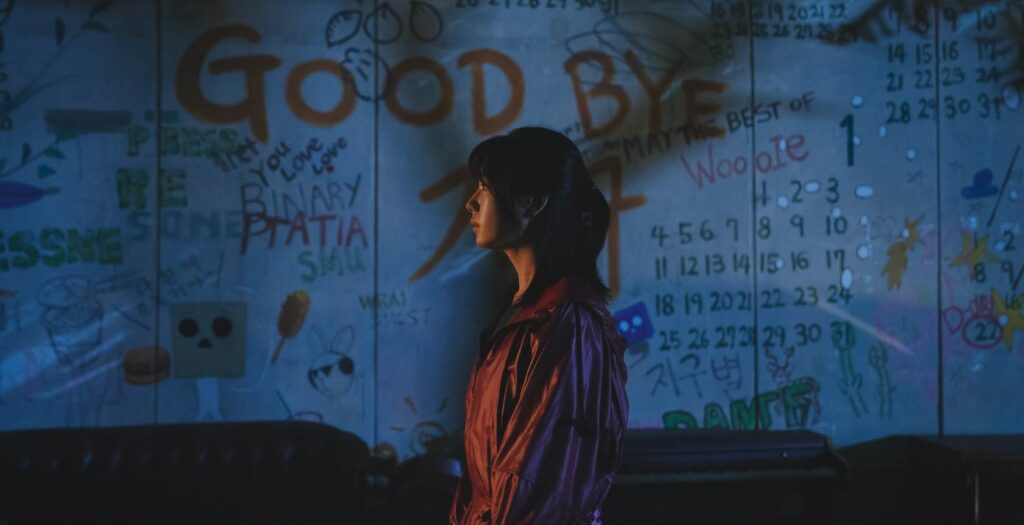An asteroid is hurtling through space on a collision course with Earth. With 300 days before impact, the world’s governments are powerless to stop the celestial projectile’s deadly journey. With the projected impact zone centered on the Korean Peninsula, South Korea swiftly descends into a state of disrepair. Those who have the power and money to, quickly flee, leaving behind those who cannot escape. Netflix Original KDrama Goodbye Earth (Jongmalui Babo), directed by Kim Jin-min (My Name) and written by Jung Sung Joo, follows a group of people as they count down the last 200 days of their lives.
Of all the media I’ve consumed over the years that center on global catastrophe in their narratives, I’ve never experienced one that manages to keep its story as human as Goodbye Earth. Rather than telling a tale filled with explosions and over-the-top heroics, it looks at what life could be like if an unstoppable ball of rock came hurtling toward our planet. And it does a remarkable job at it too.
When word first gets out about the asteroid’s existence, pandemonium ensues throughout South Korea. A civil war breaks out, as well as a total failure of the prison system, unleashing the worst humanity has to offer just as the government is paralyzed to do anything about it. The emptying of the prisons leads to an uptick in child abductions and human trafficking. This hits middle school teacher Jin Se-kyung (Ahn Eun-jin) hard when several of her students are stolen out from under her. While some are saved before being shipped overseas, some aren’t so lucky, setting an obsessive need in Jin to never fail her charges again.
Goodbye Earth can’t escape the webtoon adaptation curse of too many storylines.

While Jin’s struggle to alleviate the dangers her students face is the central plot line, Goodbye Earth touches on many subjects. From the corruption of those who scam others with promises of escape to the simple struggle to keep food on the table, many aspects of the deteriorating situation are explored throughout the series’ 12 episodes. It tries to do so much that it gets to be too much a significant portion of the time. While each plot has merit in a vacuum, trying to tell them all puts too much on the viewer’s plate. It also has a surprisingly adverse effect on the show’s pacing.
With so many plots running, you’d expect Goodbye Earth to be a rushed mess. However, the high number of stories told has the opposite effect. It slows the first half of the series to a crawl. Every plot element introduced and every character the viewer meets is accompanied by flashbacks and slow, emotion-setting sequences. The sheer number of these moments greatly detracts from the larger whole.
While the narrative sloughs at times, the characters that fill that story are always engaging. Jin’s struggle to protect often pulls in those around her. Captain Kang In-a (Kim Yoon-hye) must balance her need to fulfill her role to serve the community while constantly being undercut by her superior. Her struggles against rampant corruption throughout the system force the character to be as hard as steel at times. However, Kang always keeps a kindness in her core, allowing her to be a nuanced and complicated commander. She easily becomes the most interesting and well-executed personality in the show.
Other characters bring their own emotional elements to the story. Whether it’s the priest struggling with a crisis of faith as his church crumbles around him or a mother clinging to the memory of a lost child, Goodbye Earth treats each character with reverence, allowing all to feel real and impactful.
The show also does a great job of setting up the world visually. While some areas of the show’s central city have quickly come to ruin, much still survives. This precarious balance allows the show to emphasize the plight of its characters while not making its world seem unlivable or too well-kept. The presence of numerous ad hoc monuments to lost loved ones is also scattered about public places. Printout pictures attached to chain-linked fences and small memorial shrines never let the characters or viewers forget the burden the world imposes on its denizens.
Characters keep Goodby Earth grounded,

All of these hardships and reminders thereof make the moments of joy that occur in Goodbye Earth all the more meaningful. When loved ones are reunited, or a child is saved from imminent danger, the show drives home just how important these small joys are for the people enduring this doomed existence. When Jin is reunited with a loved one early in the series, their initial meeting is excellently delivered by both actors. Tears and fierce hugs are shown, establishing the importance of the meeting. But the show doesn’t stop there.
When the new arrival slips into sleep on Jin’s couch shortly thereafter, Jin enters a momentary panic. Thinking he may be injured or dead, despite no indication of anything other than exhaustion from their journey, she rushes to them, too easily believing that this sweet moment has already turned sour. It is a poignant scene. One of many the show eventually delivers.
While Goodbye Earth delivers great characters and some powerful human moments, it makes the audience earn them. The sheer number of characters and plots grind the front half of the series to a near halt as it sets up everything. If you can get past this introduction, you will be rewarded with a series that explores hope, despair, love, and resilience in a uniquely authentic way.
Goodbye Earth is streaming now, exclusively on Netflix.
Goodbye Earth
-
Rating - 7/107/10
TL;DR
While Goodbye Earth delivers great characters and some powerful human moments, it makes the audience earn them…If you can get past this introduction, you will be rewarded with a series that explores hope, despair, love, and resilience in a uniquely authentic way.





